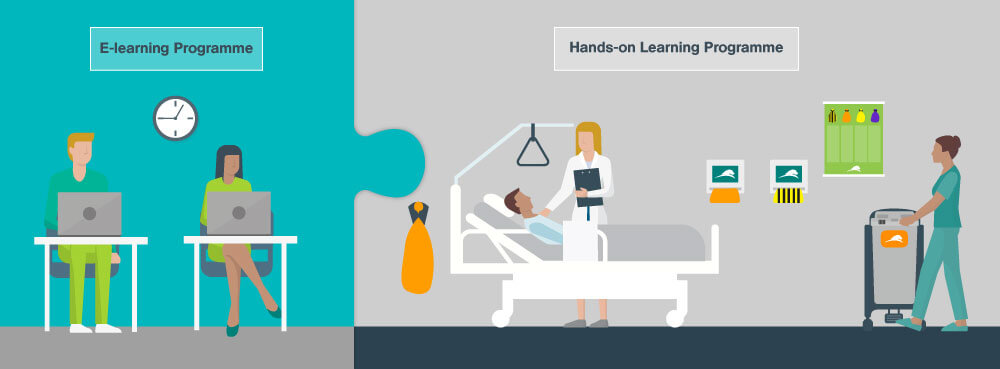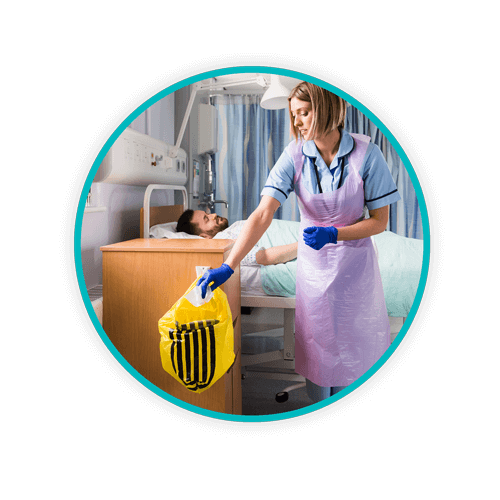Case Study: Blended Learning at Chesterfield Royal Hospital NHS Foundation Trust

Chesterfield Royal Hospital NHS Foundation Trust has embraced cutting-edge technology to solve the age-old challenge of staff education in waste storage and segregation. At the same time the Trust has improved the safety of the patient environment and reduced costs and clinical waste output. These benefits have been achieved by the development and implementation of a bespoke blended learning programme in conjunction with healthcare specialists' Sharpsmart and the adaptation of the Bag-to-Bedside System.
In this blog:
- The Challenge: Patient Interruptions
- The Solution: Bag to Bedside system
- The Results: Trained staff and better waste practices

 Outlining the problem, Diane Simpson, Chesterfield Royal Hospital’s Infection Prevention and Control lead, explained: “For years, the NHS has struggled with the concept of storing clinical waste containers within the patient environment and near to recovering patients. Whilst it has never been proven that cross-contamination from a waste container has caused infection to recovering patients, we have always had to ensure that rigorous cleaning regimes have been implemented at ward level or in single patient rooms to ensure bins are kept clean between bag changes. This inevitably contributes to patient interruptions, which we try and avoid if at all possible. Pressure is also placed on housekeeping services and cleaning teams to ensure that waste is regularly removed from the patient environment to eliminate the potential of odours emanating from bins in areas where a high volume of offensive waste is being generated.”
Outlining the problem, Diane Simpson, Chesterfield Royal Hospital’s Infection Prevention and Control lead, explained: “For years, the NHS has struggled with the concept of storing clinical waste containers within the patient environment and near to recovering patients. Whilst it has never been proven that cross-contamination from a waste container has caused infection to recovering patients, we have always had to ensure that rigorous cleaning regimes have been implemented at ward level or in single patient rooms to ensure bins are kept clean between bag changes. This inevitably contributes to patient interruptions, which we try and avoid if at all possible. Pressure is also placed on housekeeping services and cleaning teams to ensure that waste is regularly removed from the patient environment to eliminate the potential of odours emanating from bins in areas where a high volume of offensive waste is being generated.”
The Trust’s Waste and Environmental Advisor added: “Through liaison with our colleagues in the Infection Control team we had been aware of potential issues with waste being kept in the patient environment. We wanted to develop new ways of working that would reduce infection control risks and also be financially beneficial to the trust.”

During the consultation process it was identified that multiple methods of training would be required which could be effective at all “touch points” where waste was being generated and segregated. At a project team meeting, Sharpsmart's consultants presented a training package that could provide waste management training to staff at all levels.
In conjunction with members of the Environmental Compliance and Infection Control teams, Sharpsmart utilised the well-known infection control concept of “5 Moments” adapting it into the “5 Moments of Waste Segregation” using the Bag-to-Bedside system. The blended learning programme includes a myriad of training tools, all delivering the same waste segregation messages. At the heart of the programme is an e-Learning package specifically developed for Chesterfield Royal Hospital, with staff able to access the online training package in advance of the installation of the Bag-to-Bedside System.
In the run up to the go live date, the Environmental Compliance and Infection Control teams ran a site-wide promotional campaign to raise awareness of the new processes and procedures. The publicity included information banners and posters informing staff of the upcoming changes to waste management procedures. Ward and department managers were advised that their staff were required to log on to the dedicated e-Learning training in advance of their departmental install schedule.

 Uptake of the e-Learning programme was monitored through Sharpsmart’s “Learning Institute On-line” Learner Management System. Since its launch, 1,467 staff members have logged onto the system and completed the waste training course – resulting in over 450 hours of waste management training being delivered remotely.
Uptake of the e-Learning programme was monitored through Sharpsmart’s “Learning Institute On-line” Learner Management System. Since its launch, 1,467 staff members have logged onto the system and completed the waste training course – resulting in over 450 hours of waste management training being delivered remotely.
To complete the blended learning programme, Sharpsmart also produced departmental specific waste segregation posters, prompt cards, and educational workstations. These tools were strategically placed in areas where staff (who were performing clinical procedures) could "self-train." In addition, the Sharpsmart Install Technician, the Trust’s Waste Advisor, and Domestic Supervisors performed top-up training during a five week department-by-department install programme across the site.
To complete the Bag-to-Bedside installation, Sharpsmart also provided strategically placed bag dispensers and waste bin labels, which clearly identify the disposal route for the specific waste streams. A patented “bag grabber” provides a secure holding place for the waste procedure bags at point-of-care. The waste bags are routinely removed from the patient environment following use.
“It has been refreshing to work with such a forward-thinking hospital project team,” said Simon Waldram, Sharpsmart UK’s blended learning manager. “The team at Chesterfield Royal Hospital NHS Foundation Trust have provided valuable input into the development of a bespoke multifunctional learning programme which has provided the basis of healthcare training packages that we have launched across our global group of companies. The programme at Chesterfield Royal Hospital has been well received and utilised by the point-of-care staff, which has been validated in the Learner Management System reports producing 100% pass rates for the 1,467 healthcare workers who have logged onto the system."
